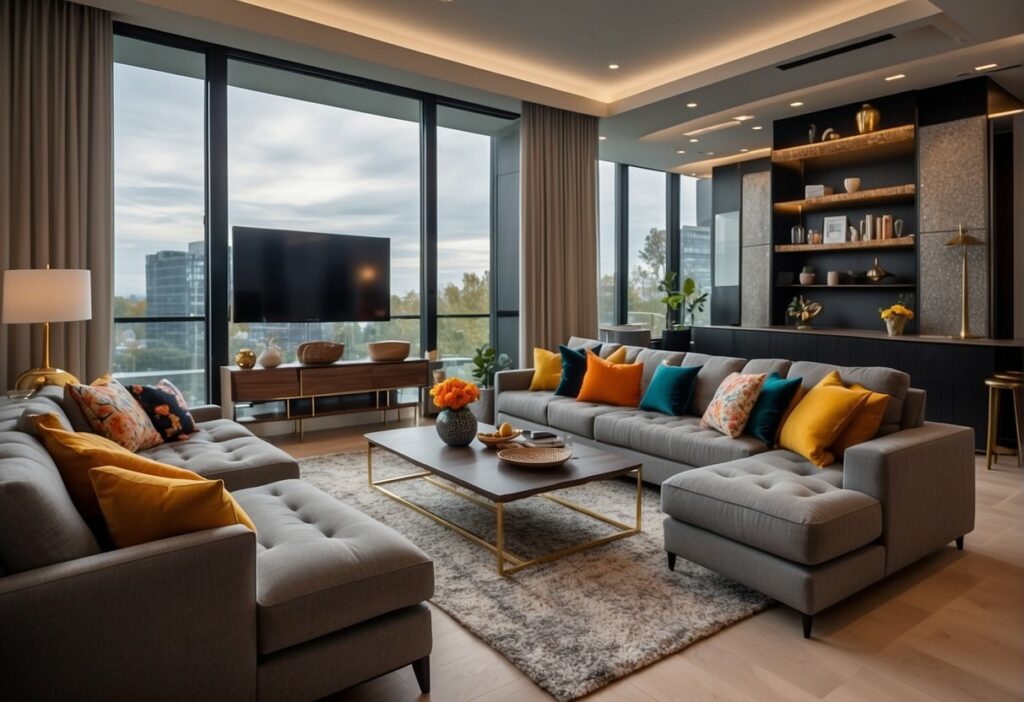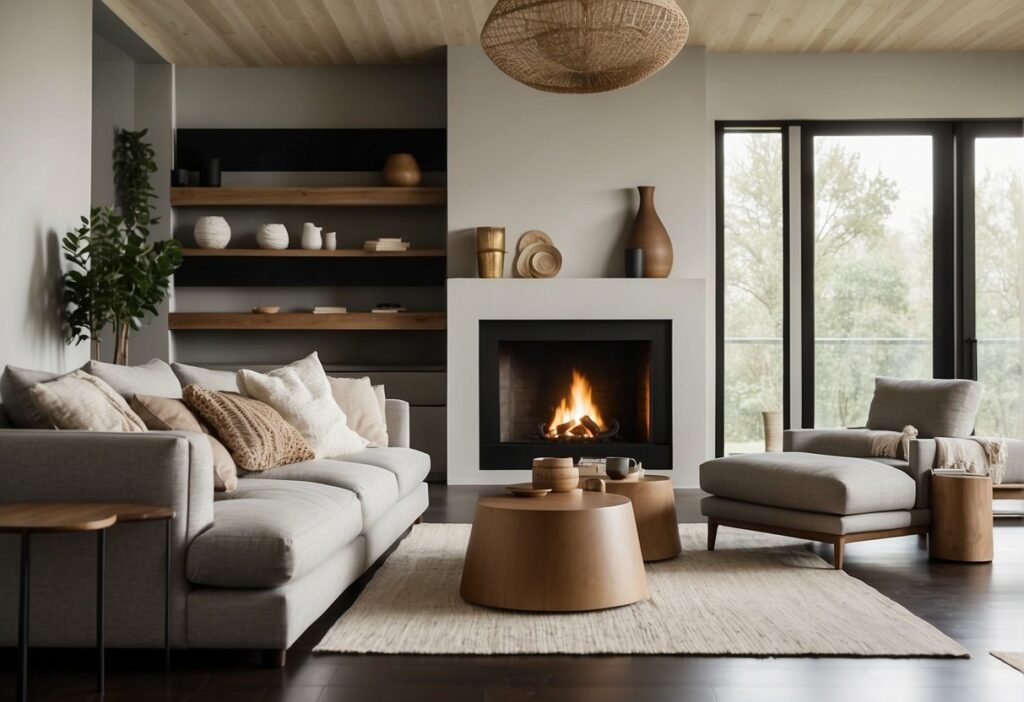How to Become an Interior Designer Without a Degree: Tips and Tricks for Aspiring Designers
Are you interested in becoming an interior designer but don’t have a degree? Don’t worry, it’s possible to achieve your dream career without a formal education. With the right skills, knowledge, and experience, you can become a successful interior designer and build a fulfilling career. In this article, we’ll explore the steps you can take to become an interior designer without a degree.

Laying the foundation for a career in interior design requires a combination of skills and knowledge. You’ll need to develop your creativity, spatial awareness, and attention to detail. Additionally, you’ll need to have a good understanding of design principles, color theory, and materials. Building a strong foundation in these areas will help you succeed as an interior designer. In the next section, we’ll explore how you can develop these skills and knowledge.
Key Takeaways
- Becoming an interior designer without a degree is possible with the right skills, knowledge, and experience.
- Developing creativity, spatial awareness, and attention to detail is essential for success in interior design.
- Building a strong foundation in design principles, color theory, and materials is key to becoming a successful interior designer.
Laying the Foundation: Skills and Knowledge

Becoming an interior designer without a degree requires a unique combination of skills and knowledge. While a formal education is not mandatory, you must possess certain essential skills and knowledge to succeed in this field. In this section, we’ll discuss the foundational skills and knowledge you need to become an interior designer.
Developing Essential Skills
To become an interior designer, you must have a keen eye for detail, a strong aesthetic sense, and excellent communication skills. You should also possess creativity and a passion for design. Technical skills such as space planning, sketching, and design theory are also essential.
Gaining Practical Experience
Practical experience is critical to developing your skill set and building your portfolio. Apprenticeships, workshops, and seminars are excellent ways to gain practical experience in interior design. You can also volunteer your services to friends and family or take on small projects to build your portfolio.
Leveraging Online Resources and Non-Traditional Education
The internet is an excellent resource for learning about interior design, and there are many online resources available to help you develop your skills. Websites like Houzz can help you stay up-to-date on the latest design trends and connect with other designers. Online learning platforms like Coursera and Udemy offer courses in design software, building codes, and other technical skills. Computer-aided design (CAD) software like AutoCAD and SketchUp are also essential tools for interior designers.
In conclusion, becoming an interior designer without a degree requires a combination of technical skills, creativity, and practical experience. By developing your skill set, building your portfolio, and leveraging online resources and non-traditional education, you can succeed in this exciting field.
Building Your Career Path

Becoming an interior designer without a degree requires more than just talent and creativity. It also requires a strategic approach to building your career path. Here are some steps to help you build a successful career as an interior designer.
Creating a Stellar Portfolio
Your portfolio is your visual CV. It showcases your talent and design skills to potential clients and employers. Make sure your portfolio is well-organised and includes your best work. Include a variety of projects that showcase your versatility as a designer. You can also include before-and-after pictures to show the transformation of a space.
Networking and Building Professional Relationships
Networking is an essential part of building a successful career as an interior designer. Attend industry events, join professional organisations like the International Interior Design Association (IIDA), and connect with other designers and industry professionals on social media platforms like LinkedIn and Instagram. Building relationships with contractors, builders, and other industry professionals can also help you get more projects and clients.
Starting Your Own Interior Design Business
Starting your own interior design business can be a rewarding career path. However, it requires careful planning and budgeting. You will need to develop a business plan, define your services, and create a budget. You will also need to consider advertising, social media, and other marketing strategies to promote your business. Offering pro bono services can be a great way to build your portfolio and gain experience while also helping your community.
Remember, becoming an interior designer without a degree requires practical experience and hard work. Consider internships, work experience, or starting as an assistant to gain experience in the industry. You can also consider taking the NCIDQ exam to become a certified interior designer. Use interior design software and rendering tools to help you visualise your designs and communicate with clients.
With dedication and perseverance, you can build a successful career as an interior designer without a degree.
Frequently Asked Questions

What are the steps to kick-start my career in interior design without formal qualifications?
If you’re passionate about interior design but don’t have a formal degree, there are still plenty of ways to kick-start your career. Start by building a strong foundation of knowledge by reading books, taking online courses, and attending workshops. Next, build a portfolio of your work that showcases your skills and style. Finally, network with others in the industry and seek out opportunities to gain practical experience.
Can I pursue a successful interior design career through online learning platforms?
Yes, online learning platforms can be an excellent way to gain the skills and knowledge you need to succeed in the interior design industry. Look for courses that cover topics such as colour theory, space planning, and design software. Many online courses also offer opportunities to connect with other students and industry professionals, which can be a valuable source of support and advice.
What opportunities exist for apprenticeships in the interior design industry?
Apprenticeships can be a great way to gain practical experience and learn from experienced professionals in the industry. Look for apprenticeship opportunities with established design firms or seek out mentorship from individual designers. You can also consider volunteering or interning with a design firm to gain experience and build your network.
How do I build a portfolio as a budding interior designer with no prior experience?
Building a portfolio can be challenging when you’re just starting out, but there are still ways to showcase your skills and creativity. Consider taking on small projects for friends and family members, or offer your services to local businesses or non-profit organisations. You can also create design concepts for fictional clients or redesign existing spaces to showcase your skills.
Is it possible for someone who isn’t naturally creative to excel in interior design?
While creativity is certainly an asset in the interior design industry, it’s not the only factor that determines success. Strong problem-solving skills, attention to detail, and a willingness to learn and adapt are also important qualities for interior designers. With dedication and hard work, anyone can excel in this field.
What are the pathways to gaining recognition in the interior design field as a self-taught professional?
One of the best ways to gain recognition in the interior design field is by building a strong online presence. Create a website or blog to showcase your work and share your design ideas with others. You can also use social media platforms like Instagram and Pinterest to connect with potential clients and industry professionals. Finally, seek out opportunities to participate in design competitions or showcase your work at local design events to gain exposure and build your reputation.



